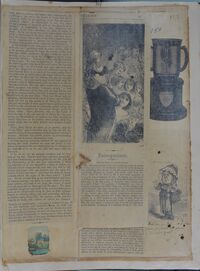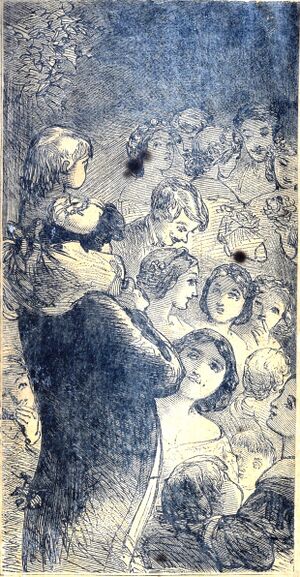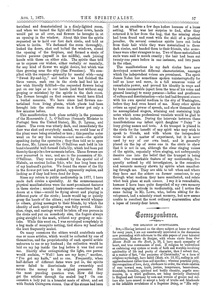 |
vol. title: Vol Four of The Theosophical Society of The Arya Samaj of Arya-wart vol. period: Sept 1878 – Sept 1879 pages in vol.: 350 |
< The Religion of Spiritualism (continued from page 8-307.1) >
begotten Son,” although such Hebrew and Greek records are authorised to be read in Latin and English by the representatives of kingcraft and pricstaraft as the “only” correct requirements of Divine Law, belief or disbelief in which ensures deathless reward or punishment. Besides, are we to be told by so excellent a brother as Dr. George Wyld that St. Erancis, Pascal, Fenelon, Maurice, Tennyson, Martineau, Robertson, Swedenborg, Savonarola, St. Teresa, and “hundreds of others” are all equally, or “truly and profoundly Christian?” If so, then I affirm that Christianity may signify anything or nothing, in orthodoxy and heterodoxy; in short, everything! Yes; as the learned and worthy (“that once familiar name”) Dr. Carter Blake dearly loves definitions, I assert, with sincere respect for himself personally, that his “eight words and phrases” may all and singular be accurately defined as pertaining to a Protean Christian, who is earnestly, but not without prejudice of bigotry, devoted to his special form of versatile Christianity, albeit readily changing its different shapes from generation to generation, as well as its utilitarian influence on politics, theology, and morals. Surely, sir, your valuable journal has done some-what better for us, its readers and subscribers, than merely giving one a weekly supply of “doctrines of abomination,” “John King chaff,” “imbecile namby-pamby verbiage,” together with a full and correct account of “angels from the seventh heavens thrust out of dark cabinets in bundles of muslin, amid the sobs of weeping women.” In the names of all the gods and goddesses at once, “for shame!” Is there any distinction in logic and metaphysics, between analogy and induction? Supposing the highest principles of human knowledge to be the result of the older light of ancient Spiritualism, would this in any way affect the validity or limit the application of those principles when seen in the newer and brighter light of modern Spiritualism? Can we alter the natural agency or principles of causality, and the very meaning of experience according to Pagan and Jewish or Christian names? What of Goethe, Humboldt, Voltaire, Laplace, and the rest? “Public Spiritualism is chiefly darkness,” we are assured by Dr. Wyld this day. Nevertheless, I protest that having been chairman again and again for some of the best mediums in Europe and America, of either sex, whose prose and verse have been applauded to the echo by thousands of intelligent, well-educated persons in each assembly, I have never heard a single utterance, sentence, or theological opinion that was not strictly in harmony with the teaching attributed to Peter in a trance or out of it. “He that worketh righteousness is accepted by God in every nation under heaven” (Griesbach). Spiritualism, therefore, in the sense of observed natural truth, is its own scientific and philosophical justification, even whether man’s conception of Deity be true or false; and in despite of religious mythology, or the dreams, the reveries, the illusions of dogmatic Christians, and all the diverse niceteria of emotional, inharmonious, yet ceromatic religionists, it is the highest achievement of modern progress throughout the world, the most splendid triumph in the history of moral and mental sciences, the only soul-satisfying and sweetly harmonious of all the many systems of nature, or plans of Divine government hitherto evolved in the religion of being good or doing good now and for ever.
Liverpool, July 18th, 1879.
Sir,- Is Spiritualism...
...

Sir,- I am thankful...
...
<... continues on page 8-308 >


Editor's notes
Inlay

< The Religion of Spiritualism (continued from page 8-306.1) >
link between heaven and earth; and, consequently, the ' uplifting of the soul to the Source of Light with such a confident belief in the spiritual world that the answer infallibly comes. A Spiritualist is one who takes Christ’s promise of spiritual gifts as one literally to be fulfilled. A Spiritualist is one who recognises the divinity of the soul; therefore, its right to aspire to God. He or she is one who truly understands that the body is the temple of the Holy Spirit, and that, therefore, this temple has a right to the fullest understanding of its requirements to protect its divine inmate by keeping it in perfect order, using and not abusing it.
A Spiritualist in the true sense of the word—and of such only am I speaking—will, in course of time, find it a far greater pleasure to enjoy the culture of the soul than any bodily sensations: by soul I mean the spark of divinity in us, not alone the Intelligence which recognises the Divinity. This is, of course, the Spiritualism of the future. We have to work for it. At present it is the bubbling and heaving of the well before the fountain springs forth; but if we wait, and pray, and work, and don’t get disgusted, or have not sufficient courage or faith because there is so much of the earth earthy about the profession of Spiritualism, the angel will surely come and heal our sores and our bruises, and give us strength to go home. It is extremely easy to find fault with the present result of Spiritualism; just as easy as it was for the learned Jews, who only saw a small sect of comparatively ignorant and rather “common people,” to look upon the Christians of the day, and say they did not see, as far as present results, any such wonderful signs of the superiority of the new ideas. They had Moses and the prophets, and did not see the need of more; and the Christians did not by any means at all times, then as now, bear out the weight of their aspirations or spiritual claims. Nor does the movement in humanity, called to-day the Spiritualist movement, by any means always justify its claims either. Those, however, who see the Spirit of God through it all, and who try to follow the clue now given, are Spiritualists; it matters not what theological school they have or do profess (most people, as a rule, simply adopt the one their fathers and mothers taught them).
From little things we must go to greater, and the “John King” seances of to-day may be, who can tell, the humble means of inaugurating real Spiritualism in to-day’s history. Ridicule has potent powers in exterminating feeling; but it cannot exterminate truth.
It rests upon us, however, whether we are capable of bearing the truth, whether we open our minds to the influx of spiritual life now waiting for us, or whether we are content to be as we are, and live upon what we have got.
If we do so, can we promise. ourselves, and be very sure of the fact, that we shall have spiritual prosperity, and that Christianity, as exemplified by the few, will be the Christianity of all; and that materialism (I wont say atheism—it is too incredible a thing to believe in) will take to its wings and fly, and that men will be full of love and peace with one another, and the earth full of love to God and man? Are these the state of things towards which the signs of the times point? I think not. Do we not see that as our intellectuality and force of reason increase, our faith, as a mere extra as it were, must perish, and that if we deny the power of spirit now we must end by denying it in the past? We must establish the power and truth of the so-called miraculous now, or the results will surely be that as faith without reason is certainly dying out, each generation will take us farther away from God; the mystery of life and the tragedy of death will neither be solved nor changed.
Now is our opportunity; and again I venture to say, if we will fearlessly and thankfully press on with our intellects in full working order, and our hearts thankful for all spiritual blessing, we shall ere long arrive at that haven which Christianity is leading us to, when religion will not be only faith in the past, but knowledge for the present and a certainty of the future.

The Religion of Spiritualists
Sir,—Having lectured on the above subject at home or abroad for many years, I am not unnaturally interested in the discussion now proceeding with reference to the able papers of your talented contributor, Madame de Steiger, with whose views from Our House Built on the Rock, p. 28, I have much sympathy of heart, and true communism of soul. If religion be understood as embracing any system or mode of faith and worship-involving spirituality of fife and purity of character, then I submit that, as a matter of fact, “the purposes of Christianity,” as a form of religious mythology, have failed (Matt. xix. 12, 21), ending in self-aggrandizement rather than self-sacrifice; whereas practical piety, the recognition of love, duty, obedience to order, the whole relation of man toward man, truth, justice, temperance, benevolence, friendship, humility, spiritual and bodily chastity, angelic communion, in a word godliness, are being devoutly illustrated in England and Germany by men and women of genius and culture who have ceased to accept a body of truths and falsehoods as the infallible revelations of a Supreme Being, or “His only <... continues on page 8-307 >
Editor's notes
Sources
-
London Spiritualist, No. 362, August 1, 1879, pp. 57-8

